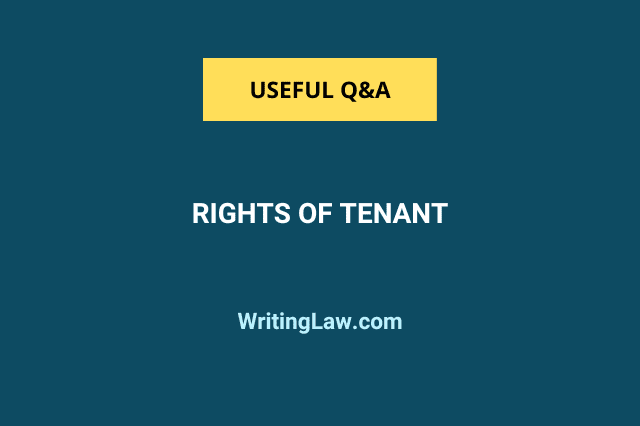
Tenancy is the legal right to possess or occupy land, a house, or a unit under a lease or for rent. And the tenant is the person who acquires land, a house or any other unit on rent.
In the emerging world, renting an apartment is becoming the norm. There have been instances in India where tenants are exploited. Many people in our country live in terrible conditions in rented housing. The tenants must understand and be aware of their rights.
The Model Tenancy Act 2021 was created to address the issue of abuse (for example, removing them from rental property, not returning their advance, charging extra rent than what is decided by the rent agreement, and so on) in India, which has been reported in numerous instances by both landlords and tenants. The sole purpose of this Model Tenancy Act 2021 is to establish a transparent relationship between tenants and landlords.
A tenant in India has been guaranteed several rights, such as the right to privacy, fair rent, the right to use essential services, the right against any rent increase and forced extension to continue using the rented property.
Understanding these rights allows a tenant to use the rented property comfortably. This law post talks about the rights of tenants in India.
Rights of the Tenants
In India, tenants are guaranteed several rights to protect them from exploitation under the tenancy. Here are the seven most important ones.
1. Right Against Unfair Eviction
The landlord cannot evict a tenant unless he proves sufficient and appropriate reason or cause for that step. The landlord can only evict the tenant if there is a breach of the rental agreement on the part of the tenant. And prior notice must be given by the landlord to the tenant for the eviction. For example, subletting the leased property while the tenant is not obligated to do so. Also, each state has a slightly different set of rules related to eviction.
2. Right to Fair Rent
When renting out a home, the landlord cannot demand excessive rent. Generally, the rent should range from 8% to 10% of the total value of the property, which includes all costs associated with construction and property improvements.
3. Right to Privacy
The landlord cannot enter the rented property without any prior notice to the tenant. Every tenant has the right to keep their personal information private and to live in peace, free from interference or burden from anyone, including the landlord.
4. Right to Essential Services
The tenant has the right to take advantage of essential utilities such as electricity, water supply, etc. The landlord cannot terminate these services even on the non-payment of the rent by the tenant.
5. Right Against Liabilities
The tenant is not liable for any expenses incurred on the rented property for the maintenance work. According to the legislation, the property maintenance costs must be borne alone by the property owner.
6. Right Against Increase in Rent
A landlord cannot demand any increase in rent in violation of the conditions of the rent agreement. As a tenant, a person has the right not to pay any increased rent unless the rent amount raised fulfils the conditions mentioned in the law.
7. Right Against Forced Extension
A landlord cannot force a tenant to continue to stay on the rented property. A tenant has a right to vacate the rented property for a valid reason.
Related: Powers of the Rent Controlling Authority in Madhya Pradesh
- Understanding the Legislative Branch of the Indian Government - 6th May 2024
- Appointment, Oath, and Removal of Constitutional Posts in India - 28th April 2024
- Powers of Income Tax Authorities in India - 26th April 2024







